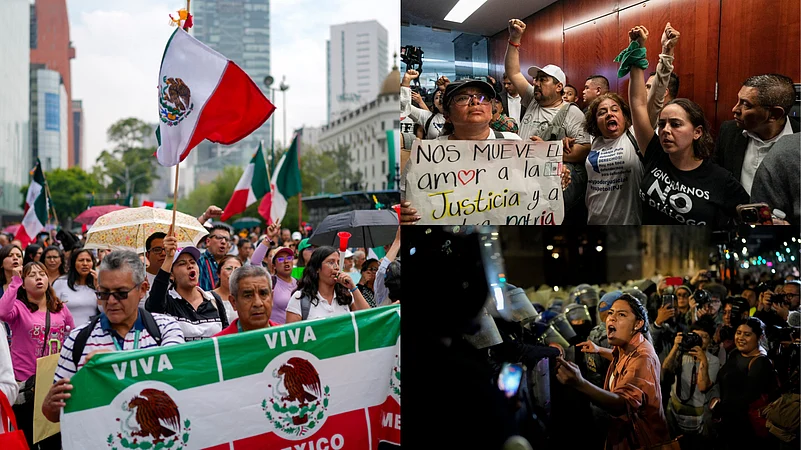Mexico has become the first country in the world to allow court judges to be elected based on the popular vote. The Mexican Senate approved its controversial judicial overhaul amid mass protests in the country.
This development comes a day after angry protestors stormed the Senate to demand a suspension of overhaul.
The overhaul comes as part of the final changes by outgoing President Andres Manuel Lopez Obrador. As per Obrador, the overhaul aims to root out judicial corruption and bias towards the economic and political elite.
Mexico's president-elect Claudia Sheinbaum, takes office on October 1 and has fully backed the plan presented by Morena.
Mexico's opposition party leader Miguel Angel Yunes also announced his support for the reform, which prompted his own party to declare him as a "traitor".
Protestors Storm Mexican Senate To Stop Overhaul
Hundreds of demonstrators and protestors stormed Mexico's Senate on Tuesday to stop the judicial overhaul. The storming of the Senate prompted lawmakers to suspend the session.
Protestors chanted "the judiciary isn't going to fall" as they were joined by opposition members and judicial workers.

Despite the protestors, the lawmakers resumed the session and the ruling Morena Party (AMLO) earned enough votes to pass the legislation.
The bill was passed in the early hours of Wednesday, prompting more unrest across Mexico.
What Is The Judicial Overhaul About?
With the Mexican Senate approving the law, the ruling government now has the power to amend the constitution which will reform the selection of the judiciary.
After the Senate's approval, the bill will now pass through the state legislatures to be enacted as a law. With the Morena party in control of 25 of 32 state legislatures, the bill is expected to be passed with ease.
The bill was passed by 86 senators and 41 voted against it. Before sending the bill to the state legislatures, the Senate must resolve the disputed provisions in the bill.
As per this, over 6,500 judges and magistrates in Mexico will be elected by a direct vote.
Along with this, the reform also calls for a reduction in the number of Supreme Court justices from nine to 11 and reducing their terms to 12 years.
Furthermore, the work experience required to be elected as a judge or magistrate will be cut from 10 years to five years.
Have Other Countries Done Similar Judicial Overhauls?
Mexico is not the only country where judges are elected based on popular vote. However, Mexico is the first country to completely overhaul its entire judicial structure.
Countries such as the United States, Switzerland, Japan and Bolivia have elections for judges. However, the popular vote formula is used only for a section of the judiciary.
In the US, many states are allowed to choose judges. However, the federal judges are still appointed by the President.
In Switzerland, judges are elected at the local level by popular vote. However, the federal judges are elected by the Parliament.
In Japan, the Supreme Court justices are selected by the government but are reviewed through a popular referendum after 10 years.
In Mexico, this overhaul will also everyone to vote for every member of the judiciary - from court ministers to federal judges.
The closest overhaul to Mexico's system was in Bolivia. However, Bolivia did not change its entire system but narrowed down how some of the most powerful judges can be elected via votes instead of being selected by the Congress.
A similar amendment was seen in Israel just months after the war with Hamas broke out. In Israel, the judicial overhaul bill presented by Netanyahu was passed by despite the absence of the opposition case.
With this amendment, the Knesset would get the power to override decisions made by the Supreme Court and the government would be involved in the appointment of the judges.


















